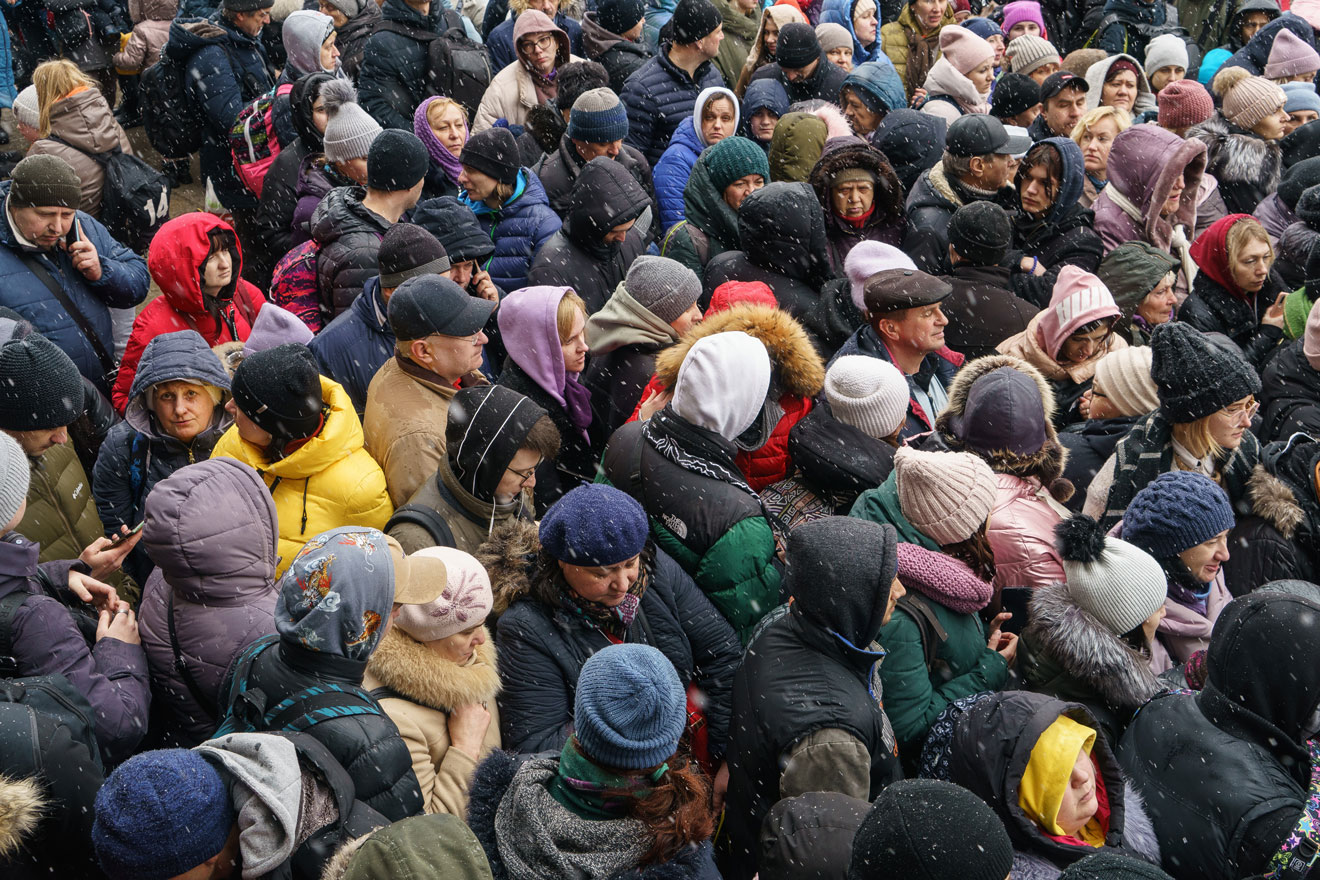When Yilena heard the gut-wrenching boom of nearby explosions at her home in Zaporizhzhia in southeastern Ukraine, she and her family left in such a hurry there was no time to put socks on the baby’s bare feet, despite freezing temperatures outside.
They didn’t even have time to collect their eldest son.
Russian troops were trying to seize the province’s nuclear power plant — Europe’s largest — and after days of running in and out of shelters as air raid sirens whirred, too nervous to eat or sleep, they panicked and ran. They didn’t stop driving until they hit Dnipro, 50 miles north.
Son Tim, 12, was staying with his grandmother and great-grandmother in another part of Zaporizhzhia. There was no way to reach him, and now they’re too scared to go back.
“We had no choice but to go, and I can’t bear that we left him,” said Yilena, 37, tears catching on her mascara-painted eyelashes.
“The great-grandmother can’t walk, so they can’t get her out of the house, and they don’t want to leave her there alone, she’s so old. Our only hope is that someone can rescue all of them.”
Yilena, her husband, Roma, 38, and their youngest son, Leova, 2, are now sleeping on sofas in a small side room of The Banana Club — a children’s day care center with walls decorated with primary-colored murals of characters from “The Simpsons.” It has opened its doors to some of the tens of thousands fleeing the eastern regions of the country as Russia rains down rockets and artillery onto Ukraine’s cities.
Next door, a construction site turns scrap metal donations into “Czech hedgehogs,” tangles of metal that are placed on roads around the city, and the country, to stop tanks from passing through. Inside the center, a network of small rooms meant as play areas host entire extended families on camp beds and rollout mattresses, including their traumatized cats.
Dnipro has so far been spared the worst of this terrible war, allowing its civilian population time to mobilize, shovel sand into sandbags and prepare Molotov cocktails to throw at any tanks that make it through the fortifications. Volunteers are also coordinating humanitarian relief to the east, which has already suffered eight years of conflict with Russian-backed separatists.
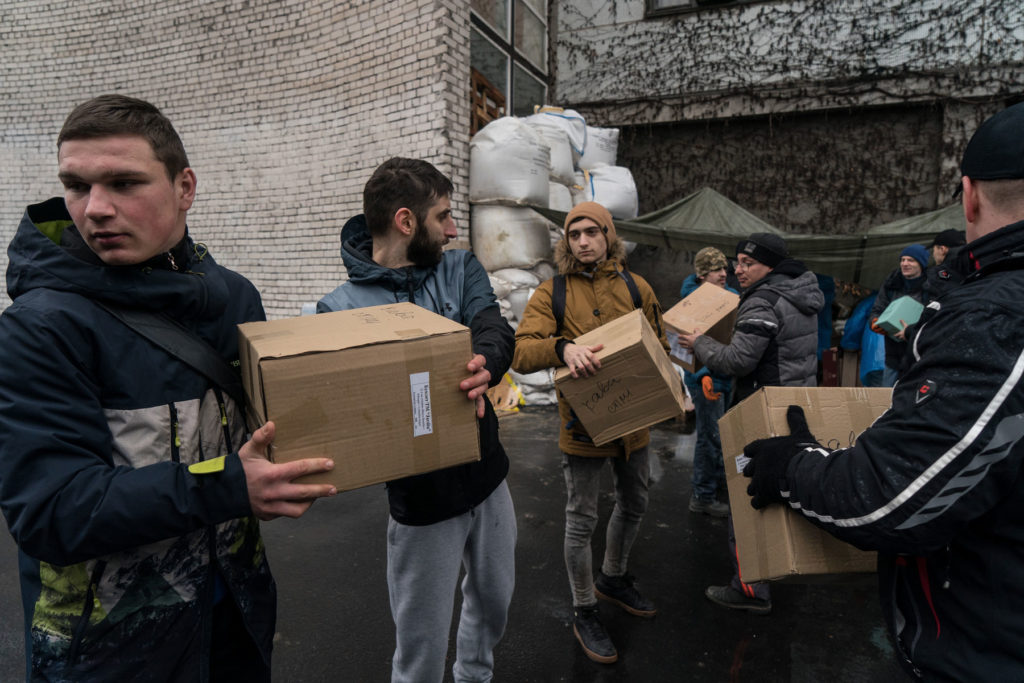
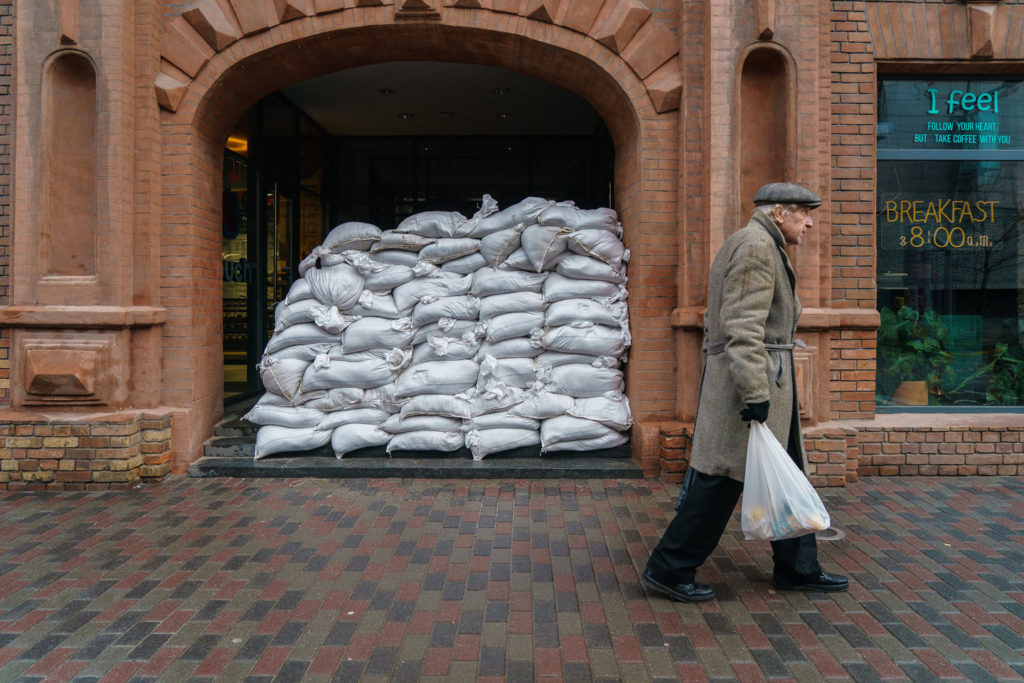
Just a few hours after Russia invaded the country from the north, a group of humanitarian volunteers had come together to set up a distribution center for humanitarian supplies. They receive donations from across the country via their Instagram account, @volunteerdnipra.
Volunteer Dnipra also organizes the flow of displaced people arriving from all over eastern Ukraine, connecting new arrivals with the nurseries, shops and hotels that have volunteered to be hosts. Many will stay only briefly before they move west. They arrive shaking, clutching confused children and terrified pets, having escaped from some of the country’s most devastated areas.
Kharkiv, in the northeast, has been bombarded for days, with prohibited cluster munitions fired on residential areas. Volnovakha has been besieged. On March 4, Russian troops seized the nuclear plant in Zaporizhzhia, attracting international condemnation and raising fears of a catastrophe. Earlier that week, on Feb. 28, Russian troops seized the southern city of Berdyansk.
More arrivals are soon expected from Mariupol, a city in southeastern Ukraine that is also under siege and feared to be among the worst hit. According to local government officials, it has no gas, electricity, internet or water supply, but information on the situation is sparse. New Lines has not been able to reach anyone in the city since March 2.
Attempts to evacuate 200,000 residents from Mariupol and Volnovakha via a humanitarian corridor have so far failed after Russia broke three agreed-upon temporary ceasefires with shelling. The Red Cross has accused the Russian forces of also mining the roads.
Ukraine brought in mobilization rules on Feb. 25, a day after Russia invaded, meaning that even if people try to flee, men of fighting age — those 18 to 60 — can no longer leave the country. As a result, wives, daughters and mothers like Yilena are faced with a difficult choice: If they choose to exit the country altogether, it will be without their men.
“My sister is at the Polish border now, waiting to cross with her two children and without her husband. It’s my dream that we will go to Iceland or Ireland — anywhere far, far away — but I don’t want to go without Roma or Tim,” she said.
If she does decide to leave, Roma will accompany her and Leova as far as he can. However, with the nearest country over 400 miles away, they can’t afford the fuel to get to the border. Trains are sporadic, and lines to secure a place on board are hours long in snow and freezing temperatures.
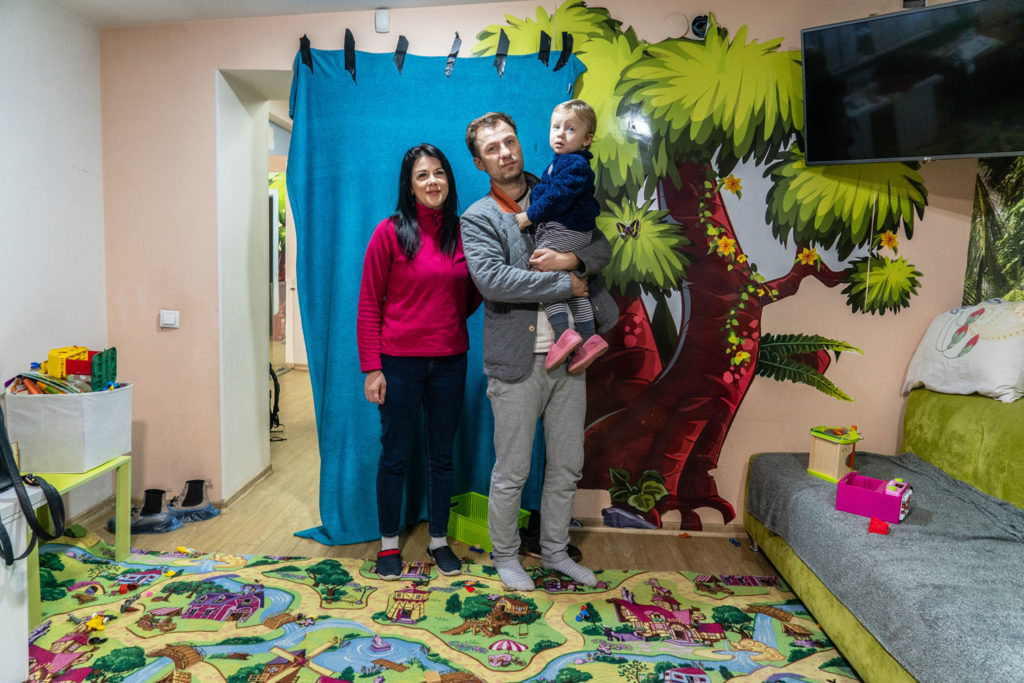
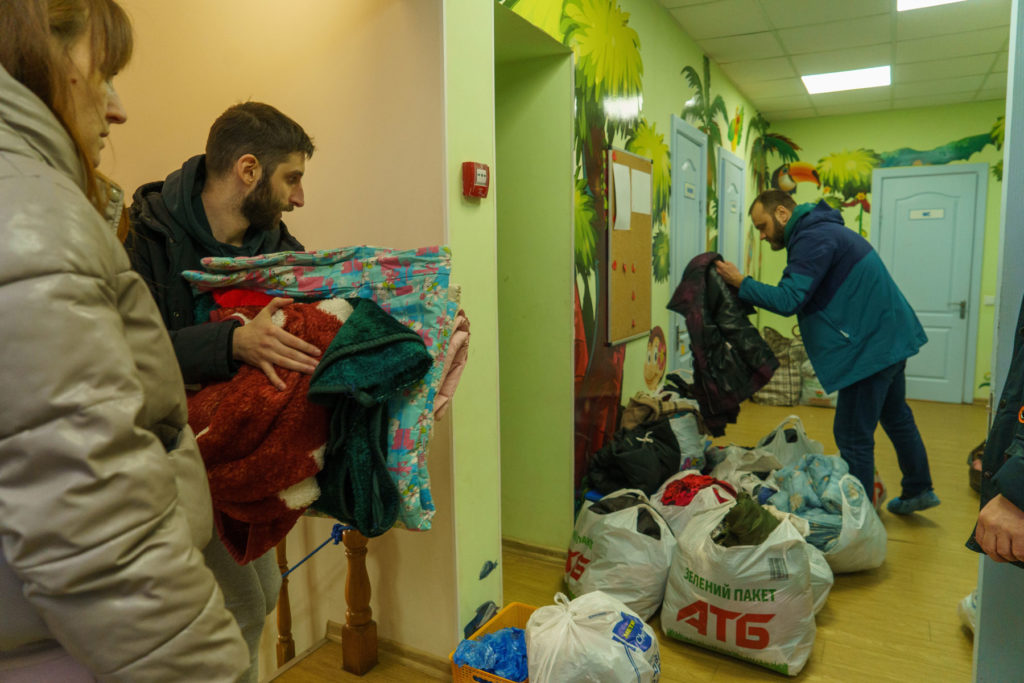
Less than two weeks since the war began, 2 million Ukrainians have already fled the country, according to the United Nations refugee agency — almost 200,000 people a day. It is thought to be the fastest-growing refugee crisis in Europe since World War II.
Most head to Poland, which shares a long border and cultural ties with Ukraine, but some enter Slovakia, Hungary, Moldova or Romania. All face an uncertain future: Europe has so far been more welcoming to Ukrainians than it was to recent refugee flows from the Middle East, but for how long can it last?
For the, perhaps, millions who are internally displaced (accurate figures are difficult to compile), many heart-breaking decisions lie between them and Europe; but if they stay, they face weeks, months or even years of war.
Yilena must first decide whether to risk settling in Dnipro, where she could be with Roma and things are currently calm, but that could change at any moment. Ukrainian security officials warned on March 7 that Russia is mounting forces to encircle the city.
“If we go on the road, it could be bombed. If we get a train, it could be bombed. If we stay, we could be bombed,” she said.
“It’s the first time in our lives we have had to face these sorts of choices — we don’t know where to even start,” Yilena said. “The stress means I have the sound of air raid sirens permanently inside my head.”
In a playroom on The Banana Club’s top floor, sleeping under a canopy of whale and teddy bear cartoons, eight members of Viktor and Natalya’s family shelter after fleeing Volnovakha. On March 1, after three days in the basement, they were among just 500 people who managed to be evacuated.
The eastern city lies close to what was the front line with separatists before Russia invaded further into the country. Moscow’s forces have been accused of indiscriminate bombing, including on civilian areas. Like other Ukrainian cities, Volnovakha is on the verge of a humanitarian crisis, and residents have reported incessant shelling and bodies lying uncollected in the streets.
Despite having weathered eight years of conflict, Viktor and Natalya say their home never felt like a target before. They believe their apartment building was the first to be hit in Volnovakha on the first day of the war.
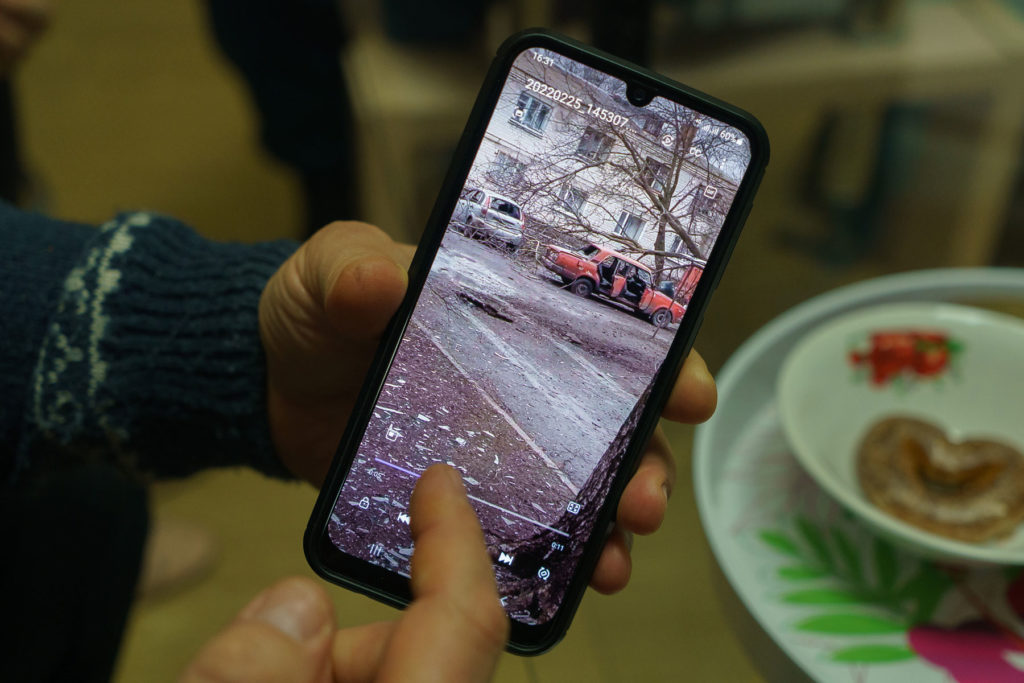
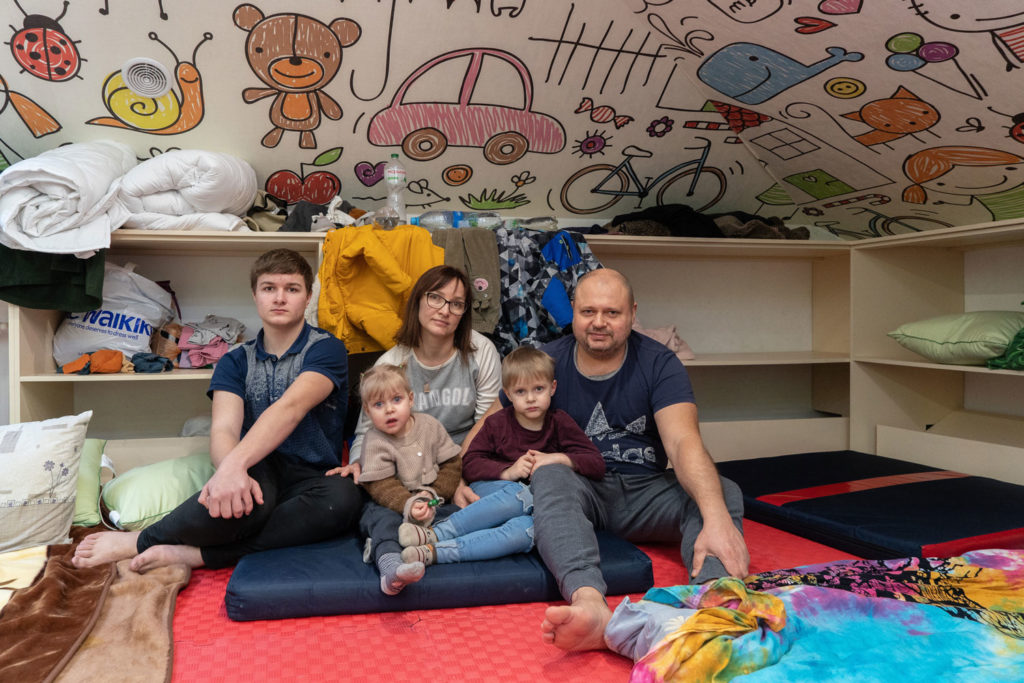
After hearing attacks at around 2 p.m., a neighbor who realized lives were in danger ran to each apartment to bang on the door, warning people to take shelter. At the last one, he was killed by flying shrapnel — he was just 32, his daughter not yet 2.
“We ran to the shelter after he came, and soon after we heard a shell crash down very close. We were lucky to be alive,” said the couple’s eldest son, Ivan, 14. “A café nearby burned down, the cars all had holes and houses no longer had windows.”
Viktor showed a picture on his phone of the site where his neighbor was killed — hot metal had gouged out long craters from the concrete in the hallway. Videos he took of damage nearby show his apartment torn to pieces by shelling, broken glass covering the floor like a glistening pool of dangerous water.
After that, the attacks went on all night and all day, every day. The family soon ended up living in the basement, shoulder-to-shoulder with 30 neighbors, with no food or electricity. Viktor and Natalya told the small children — Maksym, 5, and Tatyana, 2 — that the cracks and thuds outside were thunder.
When Ivan dashed out from the shelter one morning to get water, he caught enough phone signal to call a friend who said a corridor would be open for another 40 minutes and they should leave. They put a white sheet over the car and prayed, despite considering themselves, at the time, atheists.
“As we drove through the city, we realized there is no Volnovakha anymore. It was razed to the ground. Yet the Russians still to this day are trying to damage the civilian infrastructure that’s left — they want to sweep the city from the earth,” Ivan said.
Since Viktor is not allowed to leave the country, Natalya has not yet decided if they will stay or go. Tatyana’s behavior has changed since the war started — she often lies on the floor crying, which Natalya says she never did before. Maksym has become afraid of noises.
Ivan wanted to take part in Ukraine’s kickboxing championship and was in the running for national ranking. Now they’re not sure when he will ever get to practice again. While the family are grateful for how much love and care they’ve received, life at The Banana Club is cramped and impractical.
“We want to live abroad, but we can’t. We dream of being able to live in Ukraine, but we shouldn’t,” Viktor said.
“Just please, someone stop this war.”
All photos take by Emre Caylak



